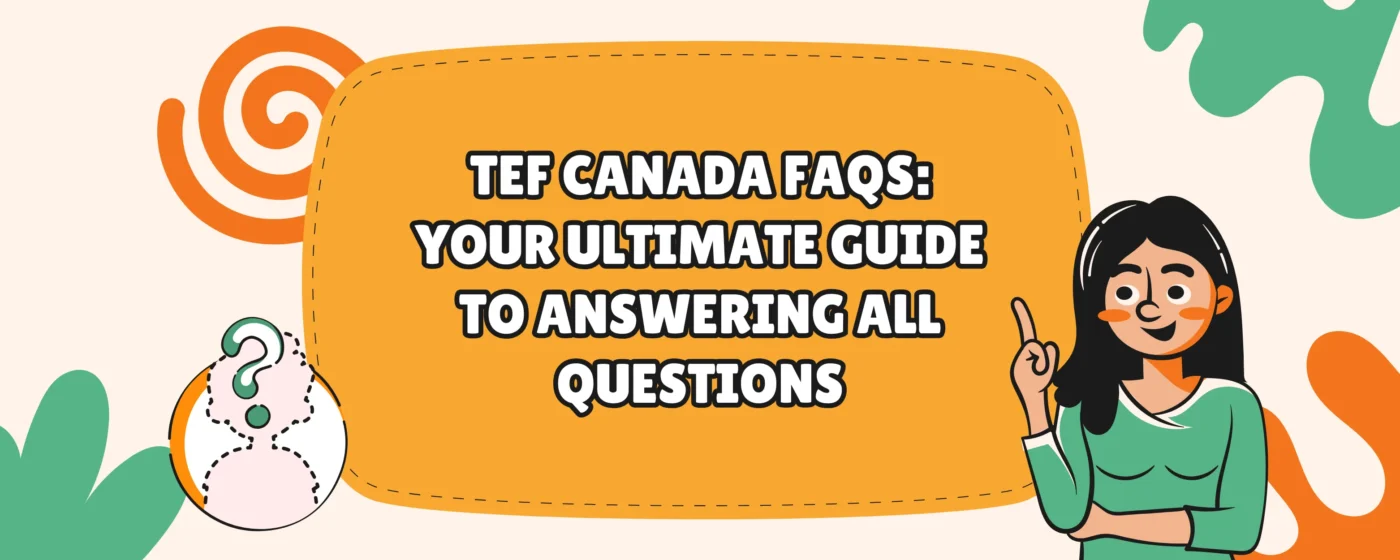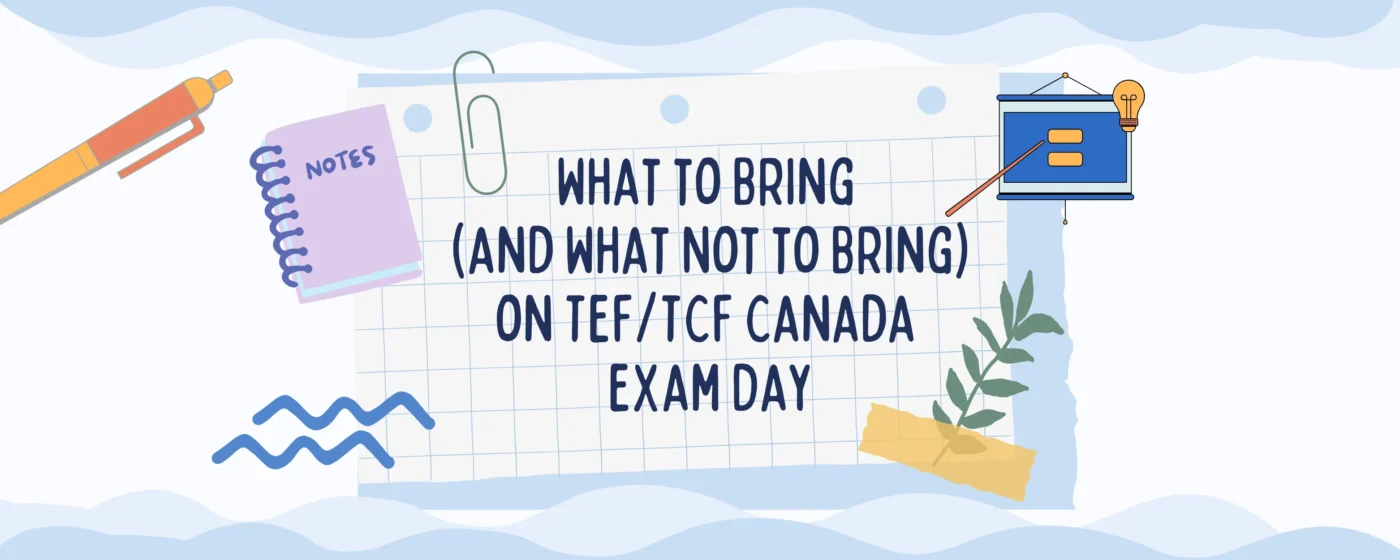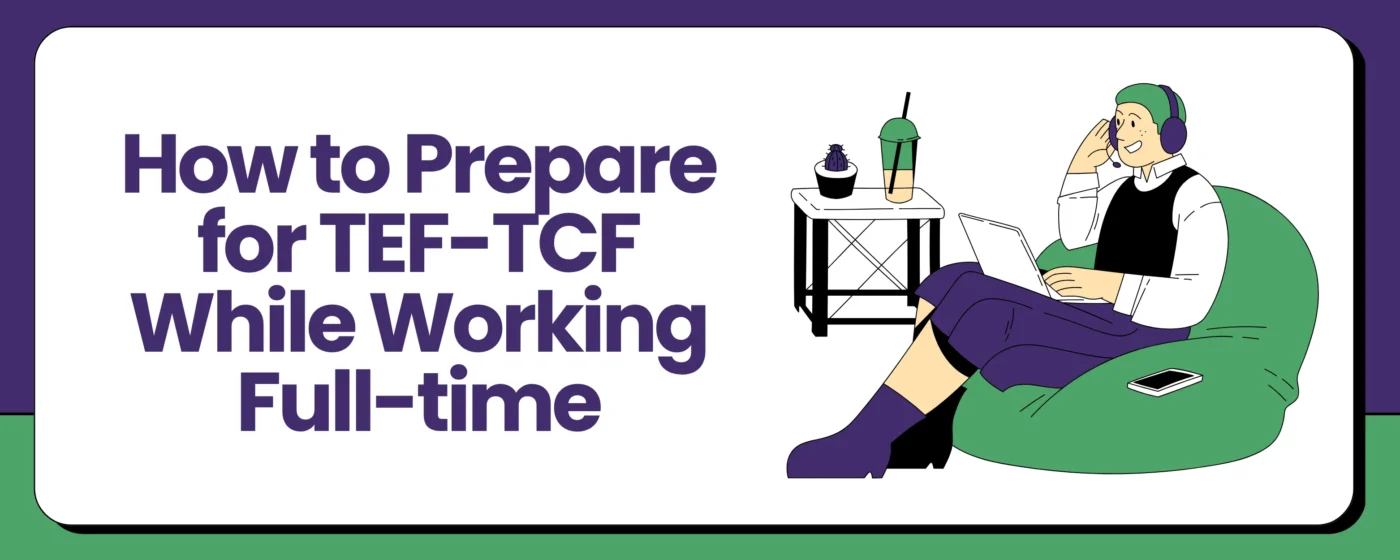Are you planning to appear for TEF Canada exam but have some questions? This blog will answer all your questions. Please contact us if you have a question that is not answered here.
Key Takeaways
- The TEF Canada exam has an electronic version that allows flexible scheduling and provides faster results for people applying for immigration or work.
- Registration for the TEF Canada exam is handled through local Alliance Française centres, which manage dates, fees, and all necessary procedures smoothly.
- Different TEF exam types exist such as TEF Canada, TEF Québec, TEF Naturalisation, and TEF Études en France, depending on your individual goals.
- TEF Canada results correspond to Canadian Language Benchmarks and align with CEFR levels, helping learners understand their language proficiency clearly.
What are TEF Exams?
TEF stands for “Test d’évaluation de français” (French Evaluation Test). It is an internationally recognized test that assesses the French language proficiency of non-native speakers. The TEF exam is administered by the French Chamber of Commerce and Industry in Paris.
The TEF exam evaluates various language skills, including listening, speaking, reading, and writing. It assesses the candidate’s ability to understand and communicate effectively in French, as well as their grasp of grammar, vocabulary, and overall language proficiency.
The TEF exam consists of several modules or sections, such as:
- Compréhension Orale (Listening Comprehension): This section tests the candidate’s ability to understand spoken French through listening exercises.
- Compréhension Écrite (Reading Comprehension): This section assesses the candidate’s reading skills by presenting texts or passages that they must comprehend and answer questions about.
- Expression Orale (Speaking Expression): In this section, candidates engage in spoken interaction with an examiner. They may be asked to describe a picture, discuss a given topic, or engage in a conversation.
- Expression Écrite (Written Expression): This section evaluates the candidate’s writing skills. They are required to complete various writing tasks, such as writing a letter, an essay, or summarizing a text.
The TEF exam is widely accepted for immigration purposes in French-speaking countries, such as Canada and Quebec. It is also often used for academic and professional purposes, including university admissions and employment opportunities in French-speaking environments.
It’s important to note that the TEF exam has different versions, such as TEF Canada, TEF Québec, and TEF Naturalisation, which are tailored to specific purposes.
What are the Scoring Levels of TEF Exam?
The TEF exam (Test d’évaluation de français) provides scoring levels that indicate a candidate’s proficiency in French. The TEF scoring system consists of six levels, which are as follows:
- Niveau élémentaire (A1): This level indicates basic proficiency in French. Candidates at this level can understand and use simple phrases and expressions related to familiar topics.
- Niveau intermédiaire (A2): At this level, candidates have a basic command of French. They can understand and communicate in everyday situations, although their language use may be limited.
- Niveau seuil (B1): This level represents an intermediate level of proficiency. Candidates can understand and participate in conversations on familiar topics, express opinions, and provide basic explanations.
- Niveau avancé (B2): At this level, candidates have a solid command of French. They can understand and express themselves on a wide range of topics, including more abstract or complex subjects.
- Niveau maîtrise (C1): This level indicates an advanced proficiency in French. Candidates at this level can understand and communicate effectively in various contexts, including academic and professional settings.
- Niveau supérieur (C2): This is the highest level of proficiency in French. Candidates at this level have near-native fluency and can understand and express themselves fluently, accurately, and effortlessly in any situation.
The TEF exam provides separate scores for each section (listening, reading, speaking, and writing) and assigns a level to each score based on the above proficiency scale. These scores and levels help individuals and organizations evaluate and compare French language proficiency accurately.
It’s important to note that the TEF scoring system may vary slightly depending on the specific version of the TEF exam being taken, such as TEF Canada, TEF Québec, or TEF Naturalisation.
How to Prepare for TEF Exams?
Preparing for the TEF exam (Test d’évaluation de français) requires a structured approach and dedicated practice. Here are some steps you can take to prepare effectively:
- You can join our TEF exam preparation batch. This is an intensive live online class conducted by experienced French teachers. Checkout our upcoming online French language classes.
- You can also use the e-learning program PrepMyFuture for TEF exam by self-studying the lessons and giving mock tests. You can check real time results and detailed analysis with explanation and detailed analysis of your strengths and weaknesses.
- Familiarize yourself with the exam format: Start by understanding the structure, sections, and tasks of the TEF exam. Review sample questions or past exam papers to get a sense of what to expect in each section.
- Assess your current level: Determine your current proficiency level in French. This will help you identify your strengths and weaknesses and plan your preparation accordingly. Consider taking a practice test or consulting a language instructor for an initial assessment.
- Set specific goals: Establish specific goals for each section of the TEF exam. For example, you might aim to improve your listening comprehension or writing skills. Having clear objectives will help you focus your study efforts.
- Build vocabulary and grammar: Enhance your vocabulary by learning new words and phrases related to various topics. Practice using them in sentences and conversations. Additionally, review and reinforce your understanding of grammar rules and structures.
- Practice reading comprehension: Read a variety of texts in French, such as newspapers, magazines, and online articles. Focus on improving your reading speed and comprehension skills. Practice summarizing the main ideas and identifying key details.
- Develop listening skills: Listen to French audio materials, such as podcasts, news broadcasts, or movies, to improve your listening comprehension. Pay attention to different accents, intonation, and context. Practice note-taking while listening to improve your retention.
- Enhance speaking skills: Engage in regular speaking practice to improve your fluency and accuracy. Find a language exchange partner or join conversation groups to practice speaking in French. Work on expressing your ideas clearly and confidently.
- Improve writing skills: Practice writing in French regularly. Start with simple exercises like writing short paragraphs or journal entries. Gradually progress to more complex tasks, such as writing essays or formal letters. Seek feedback from a tutor or native speaker to improve your writing style and accuracy.
- Take practice tests: Use official TEF practice materials or online resources that offer sample tests. Taking practice tests will familiarize you with the exam structure and help you identify areas that need further improvement.
- Seek professional guidance: Consider enrolling in a language course or hiring a tutor to receive expert guidance and personalized instruction. A qualified instructor can provide targeted feedback, suggest strategies, and assist you in your TEF preparation journey.
Remember, consistent practice and exposure to the French language are crucial for success in the TEF exam. Allocate regular study time, create a study schedule, and stay motivated throughout the preparation process.
What is E-TEF?
E-TEF (Épreuve Test d’Évaluation de Français) is the electronic version of the Test d’évaluation de français (TEF) exam. It is an online version of the TEF that allows candidates to take the exam electronically, typically via a computer or other digital devices.
It follows the same format and assesses the same language skills as the traditional paper-based TEF exam, including listening, speaking, reading, and writing.
The E-TEF offers several advantages over the paper-based TEF exam. It provides flexibility in terms of scheduling the exam, as candidates can choose a convenient date and time within the available options. The E-TEF also allows for quicker delivery of results, typically within a shorter time-frame compared to the paper-based exam.
How to Register for TEF Exams in India?
TEF exams are conducted by Alliance Française in India. Please visit the web-site or your nearest center of Alliance Française to get the details of Fee, Exam schedule and registration process. Each center may have a different schedule, fee and registration process for TEF canada exam. For Mumbai center you can register for TEF canada exam here.
What is the Registration Fee for TEF Canada Exam in India?
As of May 2023, the Registration Fee for TEF Canada exam as mentioned on Alliance Française, Mumbai is Rs. 24,780 including GST.
What are the Different Versions of TEF Exam?
The TEF (Test d’évaluation de français) exam offers different versions that cater to specific needs and requirements. Here are the various versions of the TEF exam:
- TEF Canada: This version of the TEF exam is specifically designed for individuals who are applying for Canadian immigration or Canadian citizenship. It assesses French language proficiency for immigration purposes and follows the standards and requirements set by Immigration, Refugees and Citizenship Canada (IRCC).
- TEF Québec: The TEF Québec is intended for individuals who wish to immigrate to the province of Quebec in Canada. It evaluates French language skills according to the specific requirements of the Quebec immigration system and is recognized by the Ministry of Immigration, Francization, and Integration (MIFI) of Quebec.
- TEF Naturalisation: The TEF Naturalisation version is for individuals who are seeking French citizenship through the process of naturalization. It assesses French language proficiency in alignment with the requirements established by the French government for naturalization purposes.
- TEF Études en France: This version of the TEF exam is designed for students who wish to study in France. It assesses French language skills for admission to French universities and other higher education institutions in France.
- TEF Carte de résident: The TEF Carte de résident is intended for individuals who are applying for long-term residence permits in France. It assesses French language proficiency for residency purposes.
- TEF Pour la naturalisation au Canada: This version of the TEF exam is specifically for individuals who are applying for Canadian citizenship. It evaluates French language proficiency according to the language requirements set by the IRCC for Canadian citizenship applications.
These different versions of the TEF exam are tailored to specific purposes, such as immigration, citizenship, education, or residency. Each version assesses French language proficiency according to the specific requirements and standards of the respective immigration or educational system. It is important to choose the appropriate version of the TEF exam based on your specific goals and requirements.
The TEF exam provides separate scores for each section (listening, reading, speaking, and writing) and assigns a level to each score based on the above proficiency scale. These scores and levels help individuals and organizations evaluate and compare French language proficiency accurately.
It’s important to note that the TEF scoring system may vary slightly depending on the specific version of the TEF exam being taken, such as TEF Canada, TEF Québec, or TEF Naturalisation.
Which Books Can I Use to Prepare for TEF Exam?
There are several books available that can help you prepare for the TEF (Test d’évaluation de français) exam. Here are some popular options:
- “Réussir le TEF” by Gaëlle Karcher and Isabelle Goussé: This comprehensive guide provides practice exercises and strategies for each section of the TEF exam. It includes audio recordings for listening comprehension practice and covers all the language skills assessed in the exam.
- “Préparation à l’examen du TEF” by Corinne Kober-Smith and Nada Kadhim: This book offers a structured approach to TEF exam preparation with exercises, sample questions, and tips for each section. It includes two complete practice exams and is suitable for both self-study and classroom use.
- “Le Nouveau Précis Pratique du TEF” by Hachette: This book provides detailed explanations of TEF exam tasks and offers extensive practice exercises. It covers all the sections of the exam and includes audio materials for listening comprehension practice.
- “Entraînement intensif au TEF” by Emmanuelle Dancourt: This book focuses on intensive practice for the TEF exam. It offers numerous exercises, sample questions, and practice tests for each section. It also provides tips and strategies to improve performance in the exam.
- “ABC TEF: Test d’évaluation de français, 250 activités” by Samia Aïssaoui: This book features a collection of 250 activities and exercises to develop the skills needed for the TEF exam. It covers vocabulary, grammar, reading comprehension, listening comprehension, and speaking.
Additionally, you can explore online resources, such as official TEF practice materials available on the Chambre de Commerce et d’Industrie de Paris (CCIP) website, as well as language learning platforms that offer TEF preparation materials.
When choosing a book, consider your specific needs, study preferences, and the level of the TEF exam you are targeting. It’s also beneficial to supplement your book study with additional resources like sample questions, online practice tests, and interactive learning tools to enhance your preparation for the TEF exam.
What is the Difference Between TEF and TCF Exams?
TEF (Test d’évaluation de français) and TCF (Test de connaissance du français) are both language proficiency exams that assess French language skills. While they serve similar purposes, there are some differences between the two:
- Test Content: The TEF assesses language skills across four sections: listening, reading, speaking, and writing. It provides a comprehensive evaluation of overall language proficiency. The TCF, on the other hand, focuses primarily on listening and reading comprehension skills, with optional modules for speaking and writing.
- Scoring: The TEF uses a scoring system that ranges from 0 to 900 points, with separate scores for each section. The TCF provides a score based on a scale of 100 to 699 for the compulsory listening and reading sections, and additional scores for the optional speaking and writing sections.
- Recognition: The TEF is widely recognized and accepted in various countries, including Canada, for immigration and citizenship purposes. It is also accepted by some academic institutions for French language proficiency requirements. The TCF is recognized by educational institutions and organizations primarily for academic purposes, such as university admissions or study abroad programs.
- Test Format: The TEF offers different versions tailored to specific purposes, such as TEF Canada, TEF Québec, and TEF Naturalisation, each with its own requirements and test format. The TCF has a standard format, but offers optional modules for speaking and writing that can be added to the compulsory listening and reading sections.
- Test Administration: The TEF is administered by the Chambre de Commerce et d’Industrie de Paris (CCIP) and can be taken at authorized TEF centers. The TCF is administered by the Centre international d’études pédagogiques (CIEP) and can be taken at authorized TCF centers.
Both the TEF and TCF are widely recognized and respected assessments of French language proficiency. The choice between the two exams depends on your specific goals, such as immigration requirements, academic purposes, or personal preferences. It is advisable to check the specific language requirements of your intended destination or institution to determine which exam is most suitable for your needs.
What is the Relationship Between TEF Score, CLB-F/NCLC, CEFR?
The relationship between TEF exam scores, CLB-F levels, and CEFR (Common European Framework of Reference for Languages) levels can vary slightly depending on different interpretations and sources. However, here’s a general table that provides an approximate correlation:
| TEF Score Range | CLB-F/NCLC Level | CEFR Level |
|---|---|---|
| 0-99 | N/A | N/A |
| 100-150 | N/A | N/A |
| 151-225 | 1 | A1 |
| 226-270 | 2 | A2 |
| 271-368 | 3 | B1 |
| 369-397 | 4 | B2 |
| 398-453 | 5 | B2/C1 |
| 454-498 | 6 | C1 |
| 499-548 | 7 | C1 |
| 549-597 | 8 | C1/C2 |
| 598-645 | 9 | C2 |
| 646-699 | 10 | C2 |
It’s important to note that this table provides a general approximation and should not be considered as an official conversion. The CLB-F/NCLC levels are specific to the Canadian language proficiency framework, while the CEFR levels are an internationally recognized scale. Additionally, different immigration programs or institutions may have their own specific language requirements, so it’s essential to refer to the official guidelines or consult with the relevant authorities for accurate information regarding language proficiency requirements.





